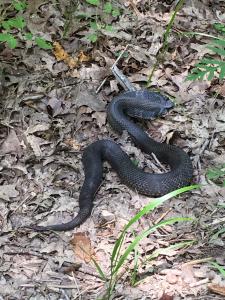In a previous article, I once examined a particularly horrifying prophecy that was proclaimed by the prophet Ezekiel in the fifth chapter of the book that bears his name. It is a promise that can be described as perhaps the most nightmare-inducing vow ever made by the LORD to His chosen people, and because of its intensity, I am convinced that it merits further reflection. Let’s take a look at that passage once again to see what other eternal truths abide within its words. Echoing warnings from the Pentateuch, God proclaimed the following through His prophet:
“therefore, thus says the Lord God, ‘Behold, I, even I, am against you, and I will execute judgments among you in the sight of the nations. And because of all your abominations, I will do among you what I have not done, and the like of which I will never do again. Therefore, fathers will eat their sons among you, and sons will eat their fathers; for I will execute judgments on you and scatter all your remnant to every wind.” (Ezek. 5:8-10)
The verses above relay gruesome historical truths alongside messages that concern God’s holiness, the nature of evil, and our proclivity toward sin. In the words that follow, I will attempt to expound upon this claim by engaging with St. Jerome’s commentary on Ezekiel 5 and offering a few thoughts pieced together from the wisdom of other ancient Christian theologians.
Grievous Things Unworthy of God

The great Church Father and Biblical exegete, Jerome, once made an intriguing theological inference in his commentary to Ezekiel 5:8-10 that is worthy of further reflection here; it concerns God’s relation to heinous acts of moral evil. The theologian records:
“…One should note that when there are noble and upright things, God confesses that he does them himself, owing to the merit of those who support them; but when there are grievous things that are unworthy of God, he says that they indeed are being done, but not by himself, as in the present passage: therefore the fathers shall eat the sons in the midst of you, and the sons shall eat their fathers. For he did not say, “I shall cause the fathers to eat their sons in the midst of you, and the sons to eat their fathers”; but with respect to what was noble and did not seem unworthy of the majesty of God, he says that he himself does it, for it follows, And I will execute judgments in you, and I will scatter your whole remnant into every wind.” (Commentary on Ezekiel)
As is noted in his comments, Jerome believed that the specific words that are utilized in this Scripture are far from arbitrary. Because Ezekiel did not attribute the cause of sinful Israel’s acts of familial cannibalism (or violence between students and teachers—see pt. 1) to God in chapter five, this says something about the LORD’s character; it reiterates the fact that God is not the source of man’s evil deeds. The Almighty promised His people that, should they disobey His voice or fail to do all His commands, they would “eat the flesh of their sons and daughters.” (Deut. 28:15; 53)
Yet, when Israel disobeyed, God did not provoke them to undertake this punishment. How then was the LORD’s promise fulfilled and His will accomplished? Israel’s Redeemer was not the cause of familial cannibalism, nor did He compel its enactors to enact it. He simply withdrew His goodness and grace from them; God turned away from the unfaithful and they were left to act in accordance with their fallen human nature and corrupt hearts. Our Creator is good and there is no unrighteousness in Him (Ps. 92:15) God does not tempt His creation, “but each one is tempted when he is carried away and enticed by his own lust.” (Jas. 1:14)
The Righteous Judgment of God
While the LORD did not coerce fathers to eat their own sons, He was indeed the cause of Israel’s judgment when Jerusalem was destroyed and its inhabitants severely punished. Jerome sees this as harmonious with the previous point and evident in the text when God declares, “I will execute judgments on you…” God credits these judgments to himself and not other events that were to transpire during the exile because righteous judgment is itself a display of God’s holiness and goodness. The LORD vowed to His chosen people that, if they should act with hostility toward Him, He would act with wrathful hostility in return (Lev. 26:27-28).
By fulfilling this additional promise Himself—which is detailed as a certainly in Ezekiel 5—God made known to Israel and all those who read Scripture, His faithfulness and truth. In a similar fashion, God demonstrated to these His justness and perfect holiness by not allowing Israel’s sins to go unpunished. The LORD is goodness itself; whenever He acts in mercy, or in judgment, this truth is revealed.
A Privation of Good
To better understand God’s relationship to evil and why He is not its author, it is important that we now take a brief look at what evil actually is. Unfortunately, to really describe the nature of evil, my previous sentence needs to be revised somewhat; evil is not an “is,” but an “is not.” The Eastern Church Father, Basil of Caesarea explains it this way:
“For wickedness does not subsist as if it were a living being. Nor do we hold that its essence coexists in another subsistence. For evil is a privation of good. Thus, also evil is not in itself an existence but arises following the maiming of the soul…For if all things are of God, how is evil from good?” (On the Human Condition)
Evil is the complete lack of a certain quality that finds its origin and foundation in the Godhead, goodness. Indeed, it exists only as non-existence; it is an absence where the presence of goodness should be found. Since all that is good is from the Creator, acts of evil cannot be attributed to God; the blame for atrocious sins—including familial cannibalism—falls squarely on the humans that commit them. Although the reality of evil is truly a part of the Almighty’s plan for creation, God did not bring sin into this world. Humans committed the first sin and they continue to perpetuate its existence on earth.
The Wicked Become Beasts
As a result of mankind’s initial transgression, we mortals have inherited a corrupt nature. The Word of God tells us that “there is none righteous, not even one.” (Rom. 3:10) For us sinners, it is inevitable that we will fall short, yet there is hope. Those who take up their cross daily and follow Christ are freed from the slavish chains of sin, and despite moments of fleshly weakness when Christians transgress the law of God, the faithful enjoy renewal and forgiveness on account of the blood that was shed by Jesus.
Spiritual consolation and transformation are given to the repentant, but what is the fate of those who choose to completely surrender to their evil desires? How are some unrepentant sinners affected by an increasing and continual participation in non-existence? The Roman philosopher, Boethius offers his thoughts:
“A short while ago you learned that all that exists is in a state of unity and that goodness itself is unity; from which it follows that we must see everything that exists as good. This means that anything which turns away from goodness ceases to exist, and thus that the wicked cease to be what they once were. That they used to be human is shown by the human appearance of their body which still remains. So it was by falling into wickedness that they also lost their human nature.” (On the Consolation of Philosophy)
If one allows sin to reign in his heart boundlessly, this person loses that which separates him from the beasts that he has been given dominion over. The wages of an ongoing engagement with a privation of good is the loss of that which makes humans “very good” in the sight of their Creator; it is the forfeiture of human nature, and thus God’s image. What is even more disconcerting, however, is that such a circumstance is not reserved for only a select group of wicked individuals. Without God’s grace, all would achieve this animalistic state.
To locate an example of the wicked’s decline into something inhuman, we need not look any further than the passage from Ezekiel quoted above. When the text speaks of the cannibalizing of offspring, it describes something uncharacteristic of mankind, yet quite prevalent within the animal kingdom; even among chimpanzees, one can find examples of fathers eating their sons.
In conclusion, God foreknew that Israel’s evil inclination would drive them to participate in horrendous, beastly acts. These horrors were even integral to His plan. Nevertheless, the LORD did not cause them; the cannibalistic fathers and sons of Jerusalem obeyed their own corrupt nature until it was lost. They pursued and took pleasure in privation until they ceased to be human.













